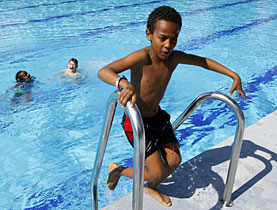Accident prevention body urges swimming tests

A swimming competency test could prevent some of Switzerland's 12,000 water accidents and 48 drowning deaths each year, a national safety organisation has said.
The Swiss Council for Accident Prevention on Wednesday said that a three-part test would be more effective in reducing injuries and fatalities than mandatory swimming lessons in schools.
The call strikes a balance between the positions of the Swiss Lifesaving Society, which in May submitted a petition calling for mandatory swimming lessons in schools, and of the country’s education officials, who say the lack of funds and infrastructure make it an impracticable proposition.
“There have been calls for better education for children – to learn how to swim and how to behave in water – for several years now,” Natalie Rüfenacht, a spokeswoman for the accident prevention council, told swissinfo.
On Wednesday, the country’s education ministers said that a national programme of swimming lessons would be impossible without partnership from external agencies.
It was a response to the submission in May by the Swiss Lifesaving Society of 44,180 signatures in support of mandatory swimming education.
No guarantees
“The school alone cannot guarantee that every child will be able to learn how to swim,” the Swiss Conference of Cantonal Education Ministers said in a statement. “Parents, schools and sport clubs and associations must work together to take responsibility for this.”
The education ministers say that while there is no national policy, many schools already provide some sort of lessons.
They have pledged to work alongside agencies to strengthen the system within schools, boost the qualification of teachers and provide water safety education.
In 2007, of the 48 people that drowned in Swiss rivers, lakes and swimming pools, 17 were under the age of 25. Since 2000, of the 122 people in the same age group who died, 56 were under the age of 14.
Most incidents occurred in open water, the accident prevention council reported.
False sense of security
The safety association acknowledges that a mandatory programme of swimming tuition would require a significant financial investment in personnel and infrastructure, which the education system lacks. The testing scheme would provide a “simple and cheap alternative”, according to Rüfenacht.
“As we know that most bad accidents in the water or close to the water occur not because people can’t swim at all, but because people can’t swim really well,” she said.
An initial swimming test for Swiss pupils would provide school officials and safety organisations with the kind of information necessary for developing any future programmes, the safety association says. “We don’t know how the problem really looks,” Rüfenacht added.
The Water Safety Check, proposed in conjunction with testing and accreditation body swimsport.ch, is identical to a system used in Canada, in which the child is required to roll into deep water, tread water for one minute and then swim 50 metres.
It would issue a type of safety “passport” to children, indicating to lifeguards and swimming supervisors that a child is capable of reacting to an emergency.
The accident prevention council notes that foreign-born children – especially those originating from countries where swimming is not a popular pastime – require more attention around water.
Responsibility for keeping youngsters safe around open water ultimately lies with parents and caregivers, Rüfenacht says. “Children are magically attracted to water, even to fountains. Obviously, parents shouldn’t leave children alone, but if they’re close to water, they should be doubly cautious.”
swissinfo, Justin Häne
The Swiss Council for Accident Prevention collected data on water safety from 2000-2007 from press reports and organisations including the Swiss Lifesaving Society and the Swiss Alpine Club.
The number of deaths due to drowning has risen steadily since 2000, when it stood at 41.
In 2003, the year of an unusually hot summer, 83 people died from drowning.
Out of 419 water-related deaths since 2000, 143 took place in open water with 32 in swimming pools.

In compliance with the JTI standards
More: SWI swissinfo.ch certified by the Journalism Trust Initiative











You can find an overview of ongoing debates with our journalists here . Please join us!
If you want to start a conversation about a topic raised in this article or want to report factual errors, email us at english@swissinfo.ch.